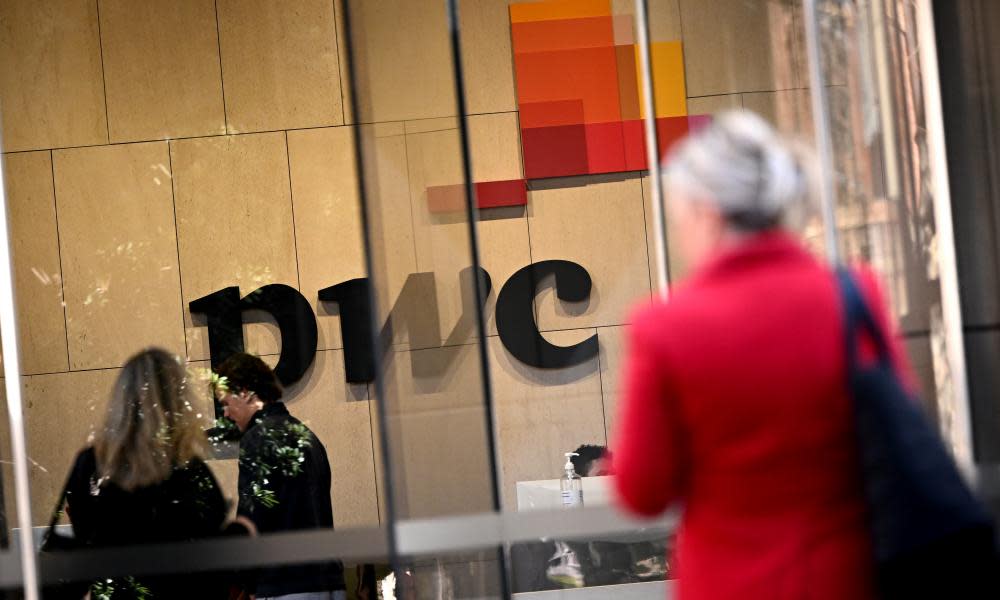‘Corrosive impact’: calls to ban political donations from Australia’s big four consultancies after PwC scandal

Australian political parties should stop accepting donations from embattled consultancy PwC and similar firms to avoid potential conflicts of interest and restore public confidence, transparency advocates have urged.
Analysis by the Centre for Public Integrity found the big four consultancy firms – PwC, Deloitte, EY and KPMG – have donated $4.3m to Labor and the Coalition over the past decade. During that time, the value of their government contracts increased by 400%.
Greens senator Barbara Pocock, who has led scrutiny of PwC’s misuse of confidential government information along with Labor senator Deborah O’Neil, said large consultancy firms should be banned from making political donations.
“Accepting money from someone and then awarding them a contract meets the definition of conflict of interest” Pocock said.
Geoffrey Watson, a board member with the Centre for Public Integrity, said the federal government’s “persistent over-reliance” on the big four consultancy firms had “a corrosive impact on the role of the Australian public service”.
“The big four’s largely party-indiscriminate donations appear designed to curry favour with whoever may be in power and remind us yet again that the absence of donations caps allows well-resourced players to have an undue influence on the exercise of public power,” Watson said.
Sign up for Guardian Australia’s free morning and afternoon email newsletters for your daily news roundup
“Integrity must be strengthened through appropriate lobbying regulation and closing the revolving door. Former partners of firms should be prohibited from holding public sector roles while they are receiving annuities.”
Last financial year, PwC donated nearly $250,000 to the major political parties. James Guthrie, an emeritus accounting professor at Macquarie University, said the scandal at PwC should force a rethink on whether that money is accepted.
“The major political parties should not accept donations from the big four, especially when they have previously received significant annual money for consulting activities,” Guthrie said.
Last year, a powerful parliamentary committee recommended the federal government legislate caps on political donations, but did not call for a ban on donations from consultants.
Related: Australia’s political parties received $90m in dark money from donors during election year
In additional comments attached to the report, independent MP Kate Chaney said “probity dictates that donations should be prohibited from substantial government contractors and government contract bidders”.
“The concern that the federal government has outsourced its public service and functions to consultants is heightened where these same consultants donate back to the government creating a ‘co-dependency’ culture,” Chaney said in the report.
Pocock said the Commonwealth Electoral Act could be updated to ensure anyone who has donated to a political party in the past 12 months is unable to apply for a contract with the federal government.
“What we’ve learned in the Senate since the PwC tax leaks scandal came to light has shown us just how deep the tentacles of the big four consultancy firms reach into our systems of governance,” Pocock said.
Related: PwC Australia’s former CEO among eight partners removed following tax leak scandal
On Monday, PwC Australia announced its former chief executive was among eight senior personnel removed from the firm’s partnership, although he is not accused of misusing government information.
On Tuesday, PwC confirmed the divestment of its government consultancy business to Sydney-based Allegro Funds. The new business, named Scyne Advisory, will have its own staff and will solely advise the public sector and their agencies.
The divestment follows months of intense scrutiny of PwC’s Australian business after its now-former international tax chief used confidential information and documents obtained through government contracts for the firm’s commercial gain.
The problems at PwC’s government consulting arm spilled into other areas of its business, with major clients including superannuation funds unwilling to work with the group until issues are resolved.

 Yahoo News
Yahoo News 
